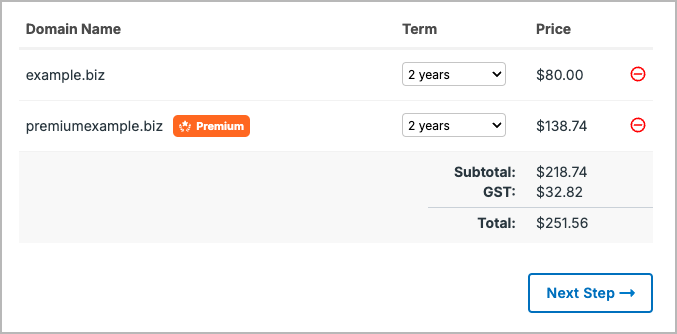When you're doing business online, standing out from the crowd is crucial. Picking a memorable domain name is an important part of that.
Domain name registries know this, too. They are effectively domain wholesalers, at the top of the supply chain. So if you're in the process of registering a new domain and you encounter something called a "premium domain", you've asked for a name that the ultimate supplier thinks is worth more than most.
Perhaps investing in a premium domain name could give you the competitive edge you are seeking. But it's worth careful consideration.
You won’t encounter premium pricing on popular options like
.nz,.au,.com,.netand.org.
Let’s delve into the realm of premium domains, exploring what distinguishes them and why they command a higher ongoing price. We’ll also look into your other options. Read on, and you'll soon be ready to make a more informed decision.
Only some TLDs have premium pricing
Firstly, it is important to note that only some top-level domains (TLDs) are affected by premium pricing, with .biz and .co (which are both run by GoDaddy Registry) being common examples. Prices are unregulated for privately-run TLDs like these, so the registry is free to charge as much as they like. Understanding this can help you make a more informed decision about whether a premium domain is the right investment for your business.
A lot of popular TLDs, including .nz, .au, .com, .net and .org, never use premium pricing. These examples are all managed by more publicly-minded entities.
What premium domains are - and what they are not
Premium domains are often marketed as short, memorable, and highly brandable - essentially prime digital real estate.
Premium domain names can pack a punch for several reasons. They are often short, or they could include industry-relevant terms that are easy to remember. Another common indicator is high-volume search keywords, which can potentially improve search engine rankings. These characteristics can make them attractive to businesses, but it’s important to evaluate whether these benefits align with your specific needs and goals.
Is there a longer term investment case to be made for premium domains? Some people might believe that premium domains could hold or increase their value over time, but it’s important to note that this is not guaranteed. The resale market can be unpredictable.
Choosing your domain
Choosing your business domain is a big decision, and it’s important to pick wisely because changing it later isn’t a walk in the park. Especially with premium domains, once you’ve made that choice, the price tag is set and it's unlikely to ever decrease. So, before you make the leap, take a moment to think it through.
Premium domains and the registration process
Update, October 2024: Our checkout now clearly marks premium domains.
When you log in and view our full domain pricing tables, you see a single price for each TLD. For instance, right now .biz domains are listed at $40/year, while .co domains are priced at $96/yr. That's the standard, non-premium price that applies to the vast majority of domains.
When you search for a new domain to register, premium domains are clearly marked and their actual price is shown.

We do not have control over which domain names are considered premium or how much more the wholesaler charges for them. If you don't want to pay the price shown, just remove the domain and continue your search.
Premium domains are often marketed as short, memorable, and highly brandable - essentially prime real estate in the digital landscape.
How to avoid premium prices
Looking to steer clear of premium prices? Your best bet is to opt for TLDs that aren’t privately owned. Many widely-used TLDs operate with broader goals beyond just turning a profit. For instance, you won’t encounter premium pricing on popular options like .nz, .au, .com, .net and .org.
If you have a domain - even a non-premium one - on a privately-operated TLD, there’s no regulator to protect you from high prices. The owner has costs to cover, profits to make, and not many other incentives to consider. This means you might face sudden price jumps or unexpected changes in terms of service.
However, if a premium domain aligns with your investment strategy and the price is okay by you, the choice is yours. Either way, we are here to get the domains that you want registered and ready to go.
Main image by StockSnap from Pixabay.
Quoted domain prices accurate as of 30 June 2025.
Article updated 16 October 2024 after we improved our checkout process. Originally published 5 August 2024.

